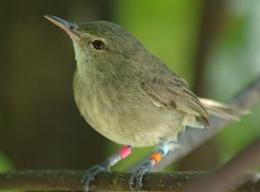Piggybacking on the report I mentioned last week is this from Science News:
A study of Seychelles warblers living on a small island in the Indian Ocean suggests that the length of telomeres — bits of DNA that cap chromosome ends — can predict a bird’s chance of dying better than its chronological age can. Warblers with shorter telomeres were less likely to survive another year, especially if the truncation happened rapidly, David S. Richardson, a molecular ecologist at the University of East Anglia in Norwich, England, and colleagues report online November 20 in Molecular Ecology. …
Young birds started with roughly the same size telomeres, Richardson says. But some warblers’ telomeres shorten faster than others as the birds age. Although there are no predators on Cousin Island, the protected area in the Seychelles where the study was conducted, life does present other stresses and strains, Richardson says. Some parts of the island may have less food. Birds may get infected with malaria parasites. And reproduction and caring for young may take its toll on female birds.
So far, the researchers haven’t linked any of these challenges to telomere length, but that’s one of the next items on the research plan, Richardson says. He’d also like to know if parents can pass along shortened telomeres to offspring.
It’s also not clear whether telomere shortening leads to poor health and death, or if truncated chromosome tips are a side effect of stress and disease. Even if losing a little off the chromosome tips isn’t enough to kill outright, “telomeres might be acting as an indicator of the sort of hard life you’re going through,” Richardson says.
